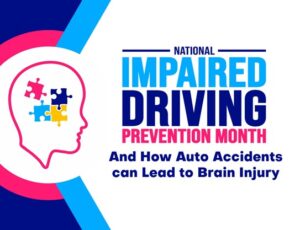Impaired Driving Accidents can Lead to Devastating Brain Injuries

December marks National Impaired Driving Prevention Month, a time to raise awareness about the dangers of impaired driving and its devastating consequences. Among these are serious neurological injuries that can profoundly affect a person’s life. For individuals in New Jersey, consulting a neurologist in New Jersey is often a crucial step in assessing and treating brain injuries caused by impaired driving accidents.
Neurological Impact of Impaired Driving Accidents
Impaired driving accidents can result in significant trauma to the brain and nervous system. These injuries often occur due to sudden impacts, rapid head movements, or blunt force trauma during collisions. Common neurological injuries from such accidents include:
• Concussions: A mild traumatic brain injury (TBI) that can cause headaches, confusion, dizziness, and memory loss.
• Contusions: Bruising of the brain tissue, which can lead to swelling and pressure inside the skull.
• Diffuse axonal injuries: Damage to the brain’s nerve fibers due to shearing forces, potentially leading to severe long-term impairments.
• Spinal cord injuries: Damage to the spinal cord that can result in loss of mobility or sensation.
• Stroke: While less common, strokes can occur as a result of certain factors related to impaired driving accidents. Traumatic injuries to blood vessels in the neck or head can lead to blood clots or tears in the arteries, which may trigger a stroke. Immediate evaluation by a neurologist is crucial if stroke symptoms, such as sudden weakness, difficulty speaking, or loss of balance, appear after an accident.
The Role of Neurology in Brain Injury Care
Neurologists play a pivotal role in diagnosing, treating, and managing brain injuries caused by impaired driving accidents. Here’s how neurology can help:
• Comprehensive assessments: Neurologists conduct detailed evaluations using neurological exams, imaging tests (such as MRIs and CT scans), and cognitive assessments to determine the extent of the injury.
• Symptom management: Neurological care focuses on managing symptoms such as chronic headaches, seizures, memory issues, and emotional disturbances resulting from brain injuries.
• Rehabilitation guidance: Neurologists collaborate with physical therapists, occupational therapists, and speech therapists to create personalized rehabilitation plans aimed at restoring function and improving quality of life.
• Long-term monitoring: Brain injuries can have lasting effects, making ongoing neurological care essential. Regular check-ups help monitor recovery progress and address any emerging issues.
Prevention is Key
While neurological care is critical after an injury, prevention is the most effective way to combat the effects of impaired driving. This December, join the efforts of National Impaired Driving Prevention Month by committing to responsible driving. Avoid driving under the influence of alcohol, drugs, or fatigue, and encourage others to do the same.
For those affected by neurological injuries from impaired driving accidents, seeking care from a neurologist in New Jersey can make a significant difference in recovery. The Medical Group of New Jersey is dedicated to providing expert care and support for patients navigating the challenges of brain injuries.